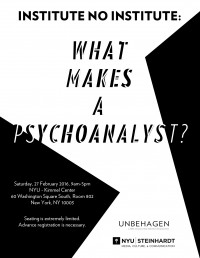INSTITUTE NO INSTITUTE: What Makes a Psychoanalyst?
Becoming a psychoanalyst is founded upon a subjective transformation that occurs in a personal analysis. It cannot be measured or predicted, yet it is the necessary factor that allows one to conduct analytic treatment. Neither the analyst alone nor a group of independent observers can determine its occurrence, but somehow together they may. That something so difficult to determine lies at the heart of professional transmission has troubled the field of psychoanalysis from its inception. Institutes, schools, and broader communities of psychoanalysts have struggled to harness this transformation to formal models of training. They have invariably encountered obstacles in the structures of authority and the exercise of power. While training outside institutions is not explicitly subject to the...Read More
Without History: EXPERIMENTS WITH CLINICAL CASE PRESENTATIONS
Unbehagen Case Presentation Event No. 1: “Without History” Saturday, January 10, 2015 Three analysts—Muriel Dimen, Patricia Gherovici, and David Lichtenstein—will present the same case based on a set of process notes from three analytic sessions. This event will explore aspects of the relationship between the patient, the individual clinician, and theory that are usually hidden by the conventional structure of the case presentation form. Other themes will include the effects of group dynamics on the case presentation experience and the ways in which case presentations may implicitly transmit essential aspects of the case, beyond what is explicitly intended. For full description, please read the attached PDF. Special thanks to Jason Royal who composed the attached PDF and who has conceived ...Read More
Jamieson Webster & David Lichtenstein: Jacques Lacan’s Return to Freud and Its Clinical Implications II
A common misconception concerning Jacques Lacan is that his work was inherently un-clinical— that he did not discuss clinical issues concerning technique or provide clinical cases—making him more of a philosopher or meta-theoretician. In this course, we hope to dispel this mischaracterization and begin with key clinical cases touched on by Lacan during his Seminars from 1952-1980, from Freud’s Little Hans and The Case of a Female Homosexual, to his discussion of cases by other psychoanalysts such as Ernst Kris, Ella Freeman Sharpe, and Joan Riviere. Through this reading of cases and Lacan’s often unknown and extensive commentary on them, we hope to touch on some key Lacanian concepts— the signifier, desire, castration, the Real, and feminine sexuality— in order to better grasp their place ...Read More
David Lichtenstein and Jamieson Webster: Jacques Lacan’s Return to Freud and its Clinical Implications II
Class, 6 Sessions: Tuesdays, January 7 – February 11, 2014 / 8-9:30pm A common misconception concerning Jacques Lacan is that his work was inherently un-clinical— that he did not discuss clinical issues concerning technique or provide clinical cases— making him more of a philosopher or meta-theoretician. In this course, we hope to dispel this mischaracterization and begin with key clinical cases touched on by Lacan during his Seminars from 1952-1980, from Freud’s Little Hans and The Case of a Female Homosexual, to his discussion of cases by other psychoanalysts such as Ernst Kris, Ella Freeman Sharpe, and Joan Riviere. Through this reading of cases and Lacan’s often unknown and extensive commentary on them, we hope to touch on some key Lacanian concepts— the signifier, desire, castration, ...Read More







